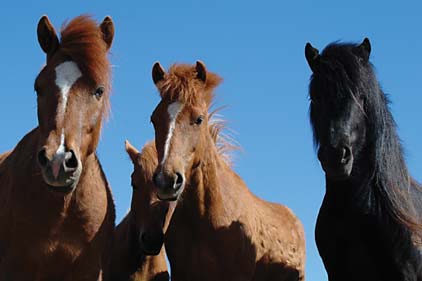Equestrian School
by Irene Schiff
We all have something to learn, we all have something to teach.
|
Schools and special divisions for
students with disabilities were abolished some time ago, but this does not
mean that social integration has been fully attained. A
lot has been done, but life itself keeps presenting new challenges that
must be dealt with and, luckily, new tools as well in
order to do so. It is a continuous race, a continuous trot and
gallop to surpass obstacles and, since we are borrowing on the
terminology, why not address ourselves to it directly? It is
particulary sensitive in nature, quite a bit patient, but certainly not
devoid of character and it has always been available to help persons in
difficulty, especially if they are children. So, why not ask for a
hand or, rather, a hoof? This is
exactly what we did and he (forgive the pronoun 'he' instead of 'it')
responded with a resounding and friendly neigh. He would even have
been willing to go in classes attended by his four cavaliers, but there
would have been some practical problems. However, as the saying goes, if
the mountain will not come to Muhammad, then the school will go to the
ring! So, this is how it went, and it turned out even better than planned.
As for every important personality, even for the horse it was considered
appropriate to have an introductory meeting with the class to illustrate
the goals of this initiative. To implement this,
the horse sent to the schools two of his "ambassadors": Dr. Stefano
Sabioni, veterinarian, and the undersigned. The veterinarian
illustrated the world of this animal integrating, as coordinated
with the science teacher, the school curriculum. The undersigned
explained to the young people the purpose of hippotherapy and
how the project would be carried out. Is there still someone,
among you readers, who doesn't know yet? In this hypothetical case,
no worry; we will right away sum it up. Hippotherapy is a very
ancient technique (fourth century A.C.) which takes advantage of the
physical and psychological help the horse can provide. The horse, in fact, has a special bearing with
rhythms and movements that stimulate anyone's muscular system and, in the
case of a disability, movements are required that otherwise would
be difficult to stimulate, or with more effort. From the psychological
point of view, the knowledge and the internal
perception of the body, and the spatial sense of self is improved and
strenghtened. For these reasons, it is quite indicated for persons
living with vision loss. Let's get back to class with the students,
particulary heedful and interested in the world they are discovering,
exactly like their Pedagogical Director and teachers at Leonardo da Vinci
and Carlo Pepoli high schools who, with enthusiasm, agreed to participate
in the project. They acknowledged that such a
special experience would be profitable for the children who would
gain the opportunity to know their
classmates in a different light. Integration is often a subject of
discussion, but preteens, even with all the
willpower they can muster, do not always have the possibility to
achieve it outside their school and
this is the opportunity to do so, and a
cool opportunity at that. Following the more academic part, we went
on to the GESE ring (Gruppo Emiliano Sport Equestri) of San Lazzaro di
Savena at the gates of Bologna. All the kids were able to get close to the
horses, to get to know them, mount them and ride them, realizing that it
is not at all simple after all. They joined in short obstacle races.
"Easy" someone could say,
revealing this way never having had close encounters with this animal.
And, it is not easy with eyes opened, imagine if they are closed! To
perceive one's own body or to relate to space and develop
orientation without the usual points of reference means creating a
new cerebral model. The children, this time with their eyes open, did some
vaulting exercises like staying on the saddle, carrying out special
twisting moves and somersaults, moving constantly their centre of gravity,
physical and mental. |
|
|
When
the 'disabled' classmates finished their exercises at the trot when the
others did theirs pacing, a spontaneous and sincere applause exploded.
Without any explanation, they understood on their own not so much that
their friends were good athletes, but most of all how wrong it was to
consider them disabled. During the following days, in school with their
teachers, they relived the experience and the emotions they felt, pleased
to recognize that they had stretched a bit further in their personal
growth. Teachers and students at the Pepoli school wanted to share with
everyone their experience and created a board with pictures and comments
in order to convey the teaching they received and the pleasure they
experienced. The initiative promoters, the
Institute for the Blind Francesco Cavazza in collaboration with the
Fondazione Cassa di Risparmio in Bologna, have set another stone on the path
to integration making it a little less difficult to
travel. | |


